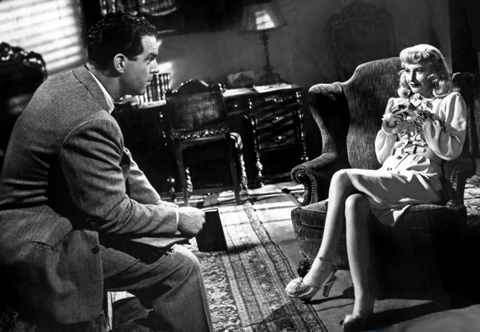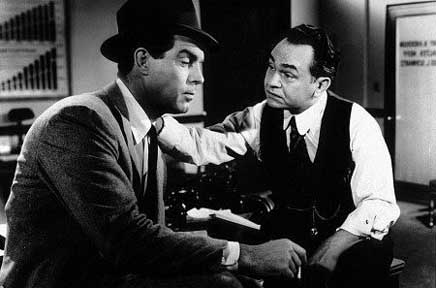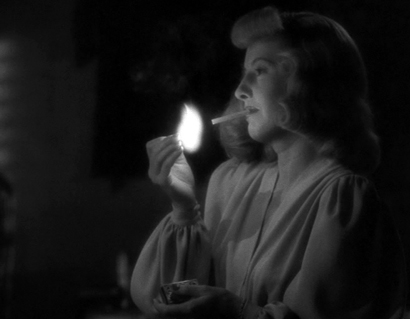|
|
Reviewed by Glenn Erickson
It's not easy to imagine the impact that Double Indemnity must have made in 1944. Americans recently disabused of their pre-war complacency probably welcomed the movie's more adult attitude toward human lust and greed. I can also see a meaningful percentage of viewers being shocked by a movie that didn't present the usual sanitized Hollywood image of wholesomeness and decency. No, Double Indemnity is the real breakthrough for the hardboiled attitude in pulp crime fiction, where murder can be cold-blooded and venality is a major motivator. The original novel was written by one dean of hardboiled fiction and adapted by another, and co-written and directed by a Viennese immigrant fascinated by American culture.
Billy Wilder's film is ground zero for Film Noir, plain and simple. The real breakthrough title for the American style, it opened the floodgate for all manner of previously taboo subject matter: adultery and premeditated murder for profit. Its cynical characters give the audience vicarious thrills as they defy all morality on their "trolley car ride to the cemetery." Wilder scored in the thriller genre as Alfred Hitchcock and Fritz Lang never had, glamorizing the attraction of sin and wrongdoing, and holding out just enough hope for a humane finish to leave audiences in hushed silence.
Just a scant ten years earlier Billy Wilder had understood barely more English than what he had heard in pop song titles. Much of Double Indemnity's dialogue sounds more like his work than that of James M. Cain or co-writer Raymond Chandler, yet it still exhibits an authentic-sounding hardboiled crackle. Modern viewers familiar with Wilder's comedies often see little difference between his sometimes overdone smart-talk and the writing in his later acid noirs and cynical comedies: "Sometimes honeysuckle can smell like murder". Modern audiences now respond with approving laughter, as if to assert that they're in on the joke as well. But Double Indemnity is not a parody, it's the real deal. It never fails to deliver the sickly allure of greed and treachery, California style.

James M. Cain's original story isn't about nice people. Self-contained tough-guy insurance salesman Walter Neff (Fred MacMurray) meets Phyllis Dietrichson (Barbara Stanwyck), gets an eyeful of her anklet chain and is soon helping her concoct a clever murder for profit and love. They make the killing look like an accident. The slick insurance swindle initially slips by Barton Keyes (Edward G. Robinson), a claims investigator for Pacific All-Risk obsessed with ferreting out cheaters and frauds. But the murderers' scheme begins to unravel when Walter realizes that he may be only the latest in a line of Phyllis' chumps and victims.
Although films noir certainly pre-existed Double Indemnity, Billy Wilder was the man with the nerve to get an un-filmable story before Paramount's cameras, without surrendering fully to the censors. After his precedent the studios immediately rushed out with hot James M. Cain properties that had been held up for years: Mildred Pierce, The Postman Always Rings Twice. A big slice of Hollywood filmmaking veered away from norm of high-key glamour, toward a style favoring darkened rooms and sinister silhouettes. Pessimistic themes became commonplace, along with characters entangled in sordid, anti-social intrigues. Sex and aberrant psychology came out into the open.
Double Indemnity breezes by on a steady stream of stylized dialogue. The best lines are rattled off by former gangster icon Edward G. Robinson, especially his machine-gun delivery of long speeches a la Wilder's later comedy, One, Two, Three). Neff and Keyes' delivery is pitched midway between the crisp street patter of '30s Warners' pictures and the laid back beat-talk that Robert Mitchum would soon bring into vogue. With these 'intimate' buddies every question is a smart remark, and every answer is another smart-remark question. "How would you like a $50 cut in pay?" says Keyes. Neff answers, "Do I laugh now or wait until it gets funny?" On the other hand, Phyllis Dietrichson's purred come-ons and breathy objections all come under the heading of pure femme fatale deception.

The movie is (for 1944) amazingly cold-blooded in its depiction of murder, an act that plays out over Phyllis' face as she revels in her own capacity for erotic destruction. But the previously self-confident Walter is horrified to learn rumors about Phyllis' background and how she became Mrs. Dietrichson. The phrase Double Indemnity is insurance terminology but also refers to the peculiar jeopardy of partners in murder: it's essential that they trust each other, but as each knows what the other is capable of, trust is impossible. As usual, Barton Keyes puts it best: "It's not like taking a trolley ride together where they can get off at different stops. They're stuck with each other and they've got to ride all the way to the end of the line and it's a one-way trip and the last stop is the cemetery."
Wilder and Chandler actually do a lot to humanize Cain's cold-blooded story. Co-workers Keyes and Neff share the movie's special relationship, at least until Keyes' ultimate disillusion. The diligent and honest Keyes is more interested in murder, fraud and skullduggery than Neff is, and wallows happily in a paperwork flood of petty larceny. He displays utter delight in getting the goods on chiselers like Fortunio Bonanova's crooked truck driver. Keyes isn't interested in money or women, the things that motivate Walter to break the law. He is most definitely attracted to Walter, an affection that has become a shared, cynical joke. Opportunist Walter lacks Keyes' fundamental morality; he covets the soft life and is a prime candidate to bite when the right apple comes along. Both Phyllis and Walter have unexpected streaks of human weakness beneath their ruthless instinct for self-preservation.
The screenplay recognizes the tragedy of a wisdom that comes too late for Walter. Phyllis's sad daughter Lola Dietrichson (Jean Heather) is enduring a miserable romance with a bitter hothead, Nino Zachetti (Byron Barr). The kids are a perfect pair of patsies. Walter keeps Lola from telling what she knows, while Phyllis independently prepares to frame Zachetti in a complicated second murder and double-cross. Phyllis experiences a suicidal last-minute flash of decency, while Walter is so sick of himself that he turns self-destructively noble. His generous romantic gestures keep us from hating him at the fade-out. Walter is just decent enough that we might imagine ourselves making the same mistakes.

Double Indemnity crashes to life with Miklos Rozsa's doom-laden score. With variations he would recycle it in a dozen more films noir. An ominous title image shows a dark shadow of a man on crutches looming toward the camera, a ghost come back to haunt the guilty. The movie raised Wilder's prestige several notches within the industry. Alfred Hitchcock wasn't known for publicly patting other directors on the back, but he was so impressed by Wilder's film that he took out a trade ad to praise him.
Universal's 70th Anniversary Limited Edition Blu-ray + Digital HD of Double Indemnity is an excellent transfer of this acknowledged classic. Many Paramount titles in the Universal library lack a proper selection of original source materials, and I am told that in this case a great deal of effort was expended to obtain a high quality presentation. It really does look good, clean and sharp with excellent contrast. I have happy memories of marvelous original nitrate prints of this at UCLA, and Universal's transfer has the same silvery sheen. The little scratches seen in the last DVD presentation (2006) appear to have been erased. The only sign of the compromised source elements is an occasional patch of density fluctuation, usually limited to a small area of the frame. Likewise, the beefy audio shows no sign of aging, especially Miklos Rosza's grim score, with its beat that sounds like approaching doom.
Fully restored is the uncanny mood of the penultimate scene in the Dietrichson's living room, at night. The sound of a radio wafts through a window. Even in the dark we sense that the room needs a dusting. It feels like Southern California -- comfort and privacy but with something very wrong going down.
The good video extras are all repeats from the older disc. Robert Osborne offers a generic TCM intro. Richard Schickel is engaged and prepared for his full-length commentary, and a second more factually detailed commentary features Nick Redman and screenwriter Lem Dobbs. As a bonus item we get an entire 1973 TV movie remake of Double Indemnity starring Richard Crenna, Lee J. Cobb and Samantha Eggar. The actors give it a good shot but it's not much.
New Wave's 2006 docu Shadows of Suspense is a long-form (38 minutes) study of the movie from all angles. It's loaded with spoilers, so don't watch it before the feature. We at first think that Eddie Muller will be our host but then we're hit by a tidal wave of worthy authorities: James "all profanity, all the time" Ellroy makes a couple of statements, and cameraman Caleb Deschanel offers the terrific observation that B&W films became more artful in the 1940s as a way of competing with color. 1
A new extra is a packet of postcard-sized reproductions of stills, a poster and a lobby card, all in an important-looking envelope. The package also includes an insert with the codes, Swiss Bank Account numbers, Voodoo chants, etc., to access a Digital HD version of the movie.
Billy Wilder knew he'd struck a new direction for movie thrillers but he wasn't the kind of director to repeat himself with another murder story. He returned to the noir world he helped define for the Oscar-winning The Lost Weekend and the superb Sunset Blvd.. Then he went too far, commercially speaking, with his bleakly pessimistic Ace in the Hole. It's so hard-boiled and cynical, it makes Double Indemnity look like your proverbial Sunday school picnic. Criterion is due out with a Blu-ray of Ace on May 6.
On a scale of Excellent, Good, Fair, and Poor,
Double Indemnity Blu-ray rates:
Movie: Excellent
Video: Excellent
Sound: Excellent
Supplements: 2 commentaries, long-form documentary, Robert Osborne Intro
Deaf and Hearing-impaired Friendly?
YES; Subtitles: English, Spanish, French
Packaging: Keep case
Reviewed: April 17, 2014
Footnote:
1. The full list of participants: Eddie Muller, Phil Cousineau, William Friedkin, Elizabeth Ward, Dr. Drew Casper, Paul Kerr, Alain Silver, James Ellroy, Paul Duncan, Caleb Deschanel, Richard Schickel, Kim Newman, Vivian Sobchack, and James Ursini. None are short-changed on screen.
Return

Text © Copyright 2014 Glenn Erickson
See more exclusive reviews on the Savant Main Page.
The version of this review on the Savant main site has additional images, footnotes and credits information, and may be updated and annotated with reader input and graphics.
Return to Top of Page
|

